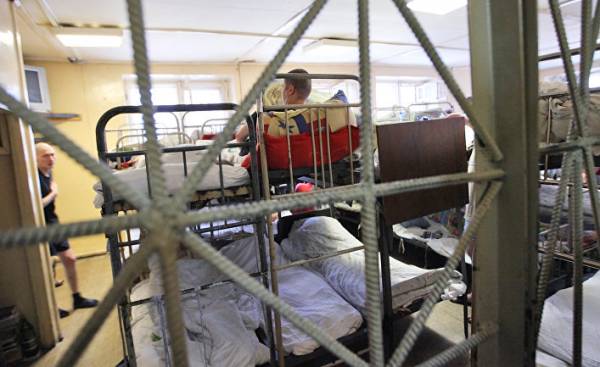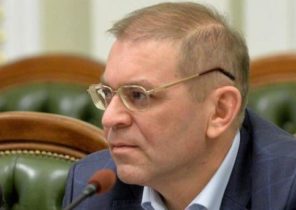
Russia continues to follow an outdated approach in the fight against drug addiction of its citizens, experts say. According to the statement of Federal service on control over drug trafficking of the Russian Federation for the year 2014 the market of drug consumption in Russia amounted to 8 million (regular and occasional consumption), of which 3 million are actively used.
Criminalization of drug use, prison and the struggle of consumers, not the actual problem and the lack of common measures to reduce drug consumption — all this does not impact positively on the number of drug addicts in the country. This is the opinion of President of the Foundation for health and social justice to them. Sergei Rylkov dealing with the problems of drug addicts and what is called harm reduction, Anna Sarang. She noted that at the moment, after the liquidation of the Federal drug control service, statistics of drug addiction in Russia is difficult to imagine.
In Vilnius in April was held a regional conference “harm Reduction in the new environment”, organized by Eurasian harm reduction network for the countries of Central and Eastern Europe and Central Asia. By the way, in the Lithuanian capital, is the headquarters of the Secretariat of the network. One of the most important aspects of harm reduction is broad coverage of these populations health services and access to services, social and legislative spheres.
In this context, is critical, say the organizers of the conference, is the transition from repressive policies to policies based on respect for human rights. The harm reduction programs involve the prevention of HIV infection, as well as work with drug-using people — providing them with access to prevention services and treatment, social services and integration into society.
These programs resonate in all countries. In particular in Russia, according to Sarang, the state operates in very different ways, and in the cities of Russia is gaining momentum of bottom-up initiatives for “cleansing” cities of drug addicts, when they are caught, isolated, and beaten. All of these measures harm reduction in Russia are not taken into account because, says Sarang, Russian authorities are guided more by ideology than practical approach to the problem of drug use. Probably one of the eloquent details of the work submitted Sarang Foundation, is an indication of the organization’s website: “the Materials are published and (or) circulated a non-commercial organization performing functions of a foreign agent”. About the problems of working with addicted people in Russia Sarang, which is dedicated to this business for about 20 years, said in an interview with Delfi.
Delfi.lt: At the time Russia was the actual so-called “crocodile”, in media published terrible photos with codeine consequences of using drugs intravenously. How is the situation now with drug use in Russia?
Anna Sarang: “the crocodile” was an interesting story, which at first nobody paid attention, but then began to write, especially abroad, it is acquired a great “HYIP”. In fact, with the “crocodile” was a big problem with the limbs, the veins. It was quite a nasty story, which is now over, and “crocodile” for several years there. Banned kazeinovye tablets, and the meaning of “crocodile” was that people who have less money and have a dependence on opiates (we have no methadone substitution therapy, in contrast to Lithuania and other European countries) who don’t have enough money for heroin did those cheap handicraft products. Now the problem is preserved, as people try to replace heroin with cheap drugs. I work in an organization, and we carry out street social work with drug users. The situation is such that continued to ban new drugs in the hope that people will stop using drugs, but this is absurd, because treatment is also no no. No substitution treatment available, rehabilitation centers. One ban will not solve the problem. Now we have a popular Tropicamide is eye drops that people have started injecting. In principle, it’s like “crocodile” and a number of drugs that become popular, and it is not yet forbidden. And each new drug is even more dangerous than the previous one.
— You work with drug addicts about twenty years. During this time, your observations, drug consumption is going up?
— It seems to me that the situation especially does not change. Of course the drug scene is changing, drugs are changing, but the number of people remains fairly stable. It is difficult to say what is the percentage in Russia is not carried out research on this subject. Before, when there was foreign funding, we have worked the who programme, the programme of the UN office on drugs and crime, had the opportunity to conduct research, including epidemiological. Then I remember the year in 2002-2003, Moscow statistics showed that about 100 thousand people use drugs. It is clear that it very much. Another evaluation of the office on drugs and crime, the UN has shown that 2% of the adult population from 15 to 64 injected drugs. If we stick to this assessment, it is possible to calculate how many 2% from 140 million the Problem is that now it is very difficult to assess any trends, changes in the population, because Russia is completely stalled scientific research on this topic.
— The state does not support the fight against drug addiction?
Now the focus is on the repressive measures of police work. Until last year, we have worked with the Federal service for control over drug trafficking, which was created in 2003, there were optimistic hopes that it will not work with street dealers, and deal with the issues of money laundering, drug traffickers, etc. But nobody cared, it was not in the interests of the service. A few years later it turned out that the head of the service Viktor Ivanov, referring to the Litvinenko case, he directed the supply of Colombian cocaine through the ports of St. Petersburg. It turned out two years ago. It is clear that programirovanii one task, but in reality, this service has become useless in catching drug addicts on the streets, drug addicts, who are not a criminal.
In other words, the struggle is with consumers, rather than the cause?
Yes. Struggling with the consumer, and no serious work is not carried out. Last year, the service eliminated, there was hope for change in the drug policy of the country, but in fact nothing has changed. And what did the Federal drug control service now deals with the interior Ministry. Just in Russia people get their sticks on the drug, and no real work are not engaged.
— How accessible are drugs in Russia?
— Quite affordable. In addition, now drugs have become available over the Internet. There was a whole subculture of people who buy drugs on the Internet. The idea is that the drugs available to any student. I do not think the more traditional scheme of drug distribution. In Moscow and St. Petersburg Internet market is more popular.
— Yet, perhaps, there is a difference between large cities and the periphery.
I don’t know what’s going on, for example, in Vologda, but in major cities drugs available via the Internet. What is happening in the villages, I have no idea, it needs to conduct research, and we have nothing like this.
— Drugs and any other intoxicating substance is there in any society. There will always be people who are using them. In a number of European countries came to the conclusion that we need to be able to live and thus this problem can be solved. Does Russia have such an understanding that the problem can be solved not only bans?
— No. Recently I was in Vienna at the Commission on narcotic drugs and I can say that there is no such as it was in the sixties: the world without drugs was supposed to be already in 1998. Declaration on the fight against drugs was adopted. In 1998 it was revised, by 2013 the world had become without drugs. Meanwhile, the drugs become more available, cheaper, etc. But Russia still does not want to abandon the idea of a world without drugs, so all policy is to impose abstinence to keep people off drugs. It is rather the political and ideological position that we do not need all of these Western approaches — harm reduction, “defeatist” policy. In Russia, in principle, policy is not based on realistic ideas about the world, but more on the ideological.
— In some cities taking action. So, for example, the story of Roizman, who won on this wave of mayoral elections in Yekaterinburg. Could you tell us about these forms of struggle?
— Yes, we have it now is very developed. One of the popular ideas is that drug users people with addiction, do not control.
— In Russia the person who use drugs are even human?
— Five years ago this issue was discussed in the society. In particular, I remember one of our activists filed a complaint with UN special Rapporteur that it is not available methadone therapy, which is globally considered the gold standard of treatment of opium addiction, but in Russia is still prohibited. For the same ideological reason. After her complaints began discussing in the press, and even the representative of some of the Russian Association of lawyers said she must first become a human, and then to fight for their human rights. It was quite common, in particular, discussed the initiatives of the organization “City without drugs” in Yekaterinburg. Many said that it is not the people, animals, zombies, etc. All this was advanced in the information space that they are not people and therefore they can take from the apartment, chained to a radiator, starved, beaten, forced to give up your friends.
How many cases were there?
I was in organization “City without drugs” in Yekaterinburg. They just caught addicts on the streets or came on call at the apartment, they were taken in so-called rehabilitation centre, forced to give up their friends and “huckster.” Worked closely with the police, put them to their operational activities. And then forcibly contained a drug without their consent in a rehabilitation center. And I must say that this center has enjoyed great popularity, the support of society and a few years ago the head of the center Yevgeny Roizman was elected mayor of Yekaterinburg in the Wake of the fight against drugs. Of course, even as a result of these activities, Yekaterinburg became a city without drugs.
— In other cities this happens?
— Yes, now in other cities is also going on, these centers where people are forced to hold, tortured, put in some ice baths, are gaining popularity. And they are not controlled. When there was still Federal drug control service, the idea was to create a qualification, quality control, but it still does not exist. These functions are taking from the Ministry of health to pass Federal drug control service, which is 7 years old took the money from the state, but it never did. Accordingly, if someone writes an application, you can start the investigative actions in respect of these centres. But it is clear that people in such a debased and zabugornom condition that few people write statements about torture, forced content.
— Still, despite everything you said, these initiatives coming from below, which speaks about the reality of the problem.
— The problem of course is. Drug use. The problem is very serious, and on this background there is civic activism, which takes such an ugly form. We are also facing the bursts of such activism. We carry out street social work and are confronted with the fact that people are starting to beat the drug at pharmacies. Such powerful ways to eradicate the problem of drug addiction. Now the wave “bookmarks” (when buying drugs on the Internet, you put them in a place and say where to come and pick up), there also come the civil activists, who beat junkies, and pass them to the police.
— The government does not intervene? Allows such activists to carry out their work?
— Honestly, I have not heard about it. “City without drugs” as a result of shut down, but rather because Roizman became mayor. And it seems recently opened a criminal case against one of these violent centers.
In other words, if you have the mark of the addict, in life, you have nothing to achieve?
— It’s a moot point, because about 75% of people who use drugs was serving a sentence in places of deprivation of liberty. Of course, it leaves a mark — it is difficult to find work, back into society.
— It turns out that drug use leads to another — the prison where the person can not leave unchanged.
Of course, it already absolutely other life, and from drugs it it will not heal. Now there is a famous story, when the guy made his website nasvobode.com. His story is typical happy. He is from Naberezhnye Chelny, talks about what in the world is called social marketing. It is where people go to buy drugs, share them with your friends, and as a result it was closed for the sale, organized crime, and gave him 7 or 9 years. He didn’t believe that was possible and thought that I would end up as a nightmare. He wrote a diary and published it before landing. Diary struck by the fact that is a typical story, as all young people using drugs there is a risk to be in the same situation. He describes the police investigation, “setup”. On the other hand, people in simple language describes what is the problem. I think it’s a strong story in terms of what people decided to tell their story.
— Does Russia’s treatment of addiction?
— We have rehabilitation centers is good, but the problem is that, first, there is no quality control — you don’t know where you’re sending your loved one: there will be a normal rehab or he will go to a labor camp, where he will be tortured and so on. Another problem is that rehabilitation centers are paid. There is no such system in Europe for the insurance or when the state provides space for the poor. Then there are rehabilitation centers available.
— Availability of drugs in Russian schools?
It’s difficult to say, but just a month ago it was reported that student overdosed on LSD. In other words, it is clear that for students, these substances are available, and the main problem is that is not conducted, no information, no adequate information about harm reduction, etc. on the Contrary, the ongoing campaign of intimidation, we want the schools to introduce urine testing. In Moscow have said. But what’s the point? Just to intimidate? Recently, the media published a photo of how students put up against the wall and sniffs the dog.
— Maybe you spoke with colleagues from Lithuania and can compare the situation?
I’ve even spent a Lithuanian program on harm reduction and everything worked quite well. Was medical work, substitution treatment, syringe exchange programme. About the political situation I do not know.
— What should be the essence of the change, which will lead to the solution of the problem of drug addiction?
— I think that the main step, should aspire to all countries is the decriminalization of the consumption and storage for your own use. This step can be done even within the existing Convention, agreement regarding drugs. Some countries even go beyond the borders of the Convention and legalize marijuana. But for most countries this is a rather complex solution because they don’t want defiant to lead on the international front. Even in Holland marijuana is still not legalized, though, and sold. That is, to bring the laws in line with reality there is not even solved. But decriminalizing the use, possession for personal use that people are not imprisoned for Smoking, for example, marijuana. Prison helps no one to solve this problem, nor man, nor the state.






